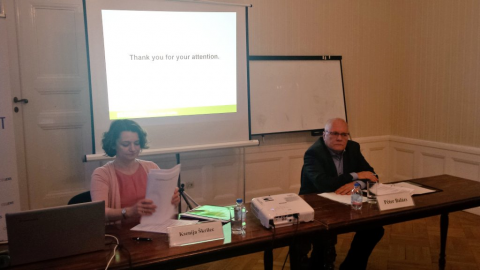Event report - “Slovenia: 25 years, achievements and new challenges”

On 23 November CEU Center for EU Enlargement Studies (CENS) and CEU Rectorate hosted its third Ambassadorial Lecture in this academic year. It was given by H.E. Ms. Ksenija Škrilec, Ambassador of the Republic of Slovenia to Hungary, on “Slovenia: 25 years, achievements and new challenges”. The address was chaired by Péter Balázs, Director of CENS and former Hungarian Minister of Foreign Affairs.
In her presentation Ambassador Škrilec focused on three elements: 1) the development of Slovenian-Hungarian bilateral relations, 2) the challenge of mass migration and 3) achievements of gender equality in Slovenia.
Slovenia is one of the countries that has been affected by the economic crisis, but today is on the right path towards the exit from the crisis. Its priority is to establish a stable and predictable business environment, to consolidate public finances and to increase competitiveness. Ambassador Škrilec highlighted that export is the engine of growth and that Hungary is Slovenia’s 6th trading partner. One of the strongest areas for the country is tourism which provides jobs for every tenth employee.
Ambassador Škrilec continued by saying that Slovenia and Hungary maintain excellent political relations and have bilateral agreements in almost all fields. One of the strongest connecting points between the two states is the protection of minorities. However, she emphasized that more could be done in the area of economy, infrastructure, energy and culture.
Ambassador Škrilec also touched upon the migration crisis issue. Slovenia is the smallest country on the Balkan route and since 17 October more than 255.000 migrants have entered Slovenia. She outlined that the mini summit in Brussels that took place on 26 October has improved cooperation and information exchange, but a lot is still to be done. She called for solving problems along the entire route from Greece onwards.
She concluded her speech by speaking about the role of women in the Slovenian society and political decision-making. There is a high share of female politicians in the government - 36% of MPs and 43% of ministers according to a Deloitte survey. Furthermore, a gender pay gap is considerably low. The World Economic Forum’s Global Gender Gap report ranked Slovenia at the 9th place. Also some 15% of board positions in large companies are occupied by women which is higher than the EU average.
Finally, Slovenia was the 11th EU nation to approve same-sex weddings in March 2015 which makes it the first country to do so out of those that joined the EU in 2004 or after. This law will probably be contested in a referendum on 20 December 2015. Nonetheless, if the law is implemented Slovenia will become the first country in Central Europe, in the post-communist Europe and the first Slavic country to allow same-sex marriages. According to the Eurobarometer data from this year 54% of Slovenians think that same-sex marriages should be allowed throughout Europe.
